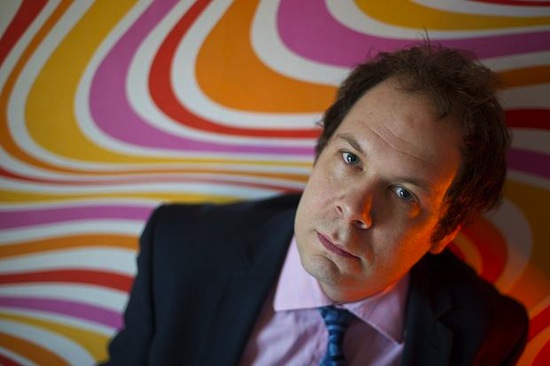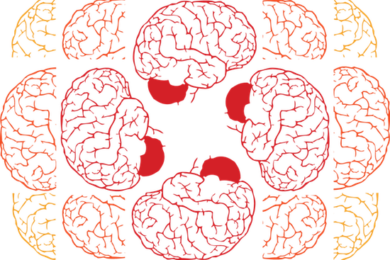The late author, thinker, ‘psychonaut’ and all-round Odysseus of psychedelia, Terrence McKenna, once wrote, “The chief lesson to be learned from the psychedelic experience is the degree to which unexamined cultural values and limitations of language have made us the unwitting prisoners of our own assumptions.”
These words could stand as a kind of motif for the unique Breaking Convention conference, a three-day, multidisciplinary symposium that discusses research, theory and expression related to what its website calls the “technicolour flag of international psychedelia”.
Even if the term ‘psychedelic’ now represents an insubstantial, amorphous concept in the context of music and arts criticism and is a rather empty descriptor in this realm (I am as guilty as anyone of its rather unfocussed use), psychedelia remains a fertile and exciting area of possibility across culture – particularly psychology, health, education, philosophy and anthropology. Breaking Convention, established in 2011 by a small team at the University of Kent and now held at the University of Greenwich, has consistently prioritised an open-minded and eclectic delving into all these things.
The psychedelic experience, it can be argued, does not necessarily mean a drug experience. ‘Psychedelic’, of course, comes from the ancient Greek words ‘psuche’ and ‘delos’, which come together as ‘mind manifestation’, while ‘delos’ can also be interpreted as ‘clarity’ or ‘visibility’. Either way, the etymology suggests no particular implication that substances are required for the psychedelic experience, and indeed things like meditation, yoga, tantric sex, forms of therapy and music can constitute this for some people.
However, Breaking Convention does devote itself to the exploration of the benefits of certain psychedelic substances for treatment of various psychological conditions, and to encourage a more composed, informed and less hysterical discussion of their potential use.
The other day I saw the latest film from Noam Baumbach, While We’re Young, a well written, well structured and beautifully acted addition to his oeuvre. One section of the film shows the four main characters attending an ayahuasca ceremony; these scenes are skilfully executed but they are designed as a somewhat comic interlude, complete with hypocritical shaman, caricatured fellow attendees and other clichés. It was mild, but it did seem like a timely example of the flippancy with which society treats such rituals and substances – and that’s without even broaching the topic of the traditional moral panic over such things on the part of mainstream media and the establishment.
Among the directors of Breaking Convention is Dr. Ben Sessa, a Bristol-based psychiatrist, writer and researcher who has worked on Britain’s only human hallucinogen study in recent times at Bristol University, and was reportedly the first person to be legally administered a ‘classical’ psychedelic drug in the UK for 33 years. He agreed to an interview, covering what Breaking Convention hopes to achieve and the how the psychedelic experience can be integrated into society in a productive, progressive way.

There is no official theme for each Breaking Convention, but does the conference lean towards certain issues or themes more than others from year to year?
Ben Sessa: Not especially. As with other years, Breaking Convention 2015 is an opportunity for all aspects of the psychedelic experience to meet and mingle. The symposia on offer are very diverse, from the latest cutting-edge neuroscience, anthropology, politics and law to spirituality, art, music and performance. All connected by their associations with psychedelics.
What is your personal contribution to Breaking Convention?
BS: My personal contribution – as well as being the Breaking Convention treasurer, co-founder and executive committee member, which means general dogsbody – is putting together the medical and neuroscience elements of the program. This year I have invited some of the leading speakers on medical and research applications for psychedelics including David Nichols, Teri Krebs, Rick Doblin, Alicia Danforth, Amanda Feilding, Robin Carhart-Harris, Luke Williams, David Nutt, Matthew Johnson and Rupert McShane.
How do you define a psychedelic substance and is there much variety of interpretation around this term in academic/medical circles?
BS: There are many definitions depending on whether one takes a medical, anthropological, sociological, legal, artistic or transpersonal perspective. A medical version might be: an organic compound, introduced exogenously into the body that produces profound alterations in thinking, perceptions, identity and spirituality.
I recently spoke with the filmmaker Gay Dillingham about her documentary Dying To Know, about Timothy Leary and Ram Dass. When asked if she thought psychedelia and the psychedelic experience could be divorced from drugs, she said yes it certainly could. For you, can the concept of psychedelia exist away from the context of drugs?
BS: The drugs – particularly LSD in the 1960s – spawned a tremendous new genre of artistic thinking and social change. It is arguable that the ‘psychedelic 60s’ would not have happened on anything like the same scale – or in the same way – without LSD. However, there were already important post-war social movements underway, like the Beats, before LSD, in which other drugs, especially cannabis, played a part. So who knows what the world might have looked like had LSD not come along?
The more important question is what do we do with psychedelia now? I think the drugs themselves and the experiences they produce in individuals and for society are too important and vital to be pigeon-holed and taken hold of by a bloodthirsty media that always aims to reduce all experience to a few simple straplines for improved consumerism.
Is it necessary for gaining support for psychedelics as therapy to move away from their affiliation with counterculture?
BS: We need to move away from negative media descriptions of counterculture. We need the media to move with us towards depicting psychedelics and the psychedelic research community in a more realistic, evidence-based – which means safe and efficacious – manner.
To what degree is the demonization of psychedelics, by a ‘bloodthirsty media’ and other influences, irreversible?
BS: Nothing is irreversible. “You are only as young as the last time you changed your mind,” said T. Leary.
In discussion of music, art and literature, the term ‘psychedelic’ has arguably become meaningless and neutered due to overuse. Do you agree and if so, what are the consequences of this for medical research and academic thought?
BS: I don’t think it has become meaningless. It represents freedom, breaking conventions and new ways of thinking. Those are very important goals for one to strive towards – in whatever pursuits one is engaged.
Medical science is driven by evidence. The evidence base for the effectiveness and safety of psychedelics is growing daily. We need people to wake up to this.
How are Timothy Leary and his legacy regarded in psychedelic academia and Breaking Convention circles today?
BS: I cannot speak for everyone else at Breaking Convention, but I believe Leary carried out important work and wrote beautifully. Ironically, much of what Tim said 40 years ago that at the time was considered wacky, is now rather mainstream. He talked about the vacuity of politics, the need for ecological reforms, the stupidity of the War on Drugs and so on. These issues are no longer controversial.
Can you briefly describe how psychedelic drugs are capable of helping a) post-traumatic stress disorder and b) palliative care?
BS: MDMA allows patients to engage with repressed painful emotional memories without being overwhelmed by the negative effect that usually accompanies those memories. In other words, it allows one to do psychotherapy and tackle and resolve difficult thoughts that are usually left unmanaged.
Psychedelic drugs have an innate capacity for the user to address existential issues, such as life, death, birth and meaning. This makes them excellent tools for patients struggling to come to terms with the existential issues of dying.
Your approach seems quite scientific and based on combining psychedelics with established modes of psychiatry and treatment. To what degree do you embrace the more esoteric, spiritual, ‘supernatural’ elements of Breaking Convention?
BS: I love all the aspects of Breaking Convention. Some people get off more on those esoteric aspects of the psychedelic experience and others prefer the science. I like both. There are different sorts of truths, different sorts of realities – it would be very arrogant of anyone to cherry-pick which they believe are right for other people. I love that Breaking Convention is a place where so many varied viewpoints can be brought together.
LSD is sometimes called the ‘empathy drug’. Are such drugs a realistic option for people without diagnosed psychological conditions, who simply want to improve their perspective on their everyday lives?
BS: I would say that MDMA is more commonly called an empathy drug than LSD. And yes, psychedelic experiences ought not be reserved only for clinical cases. Many healthy people can find new ways of thinking and new insights into their own personal growth and development with psychedelics.
How careful is Breaking Convention in ensuring that the conference does not get too caught up in academic discourse, and that it remains as accessible as possible to the general public?
BS: If you look at the programme, you’ll see there’s is no risk of that happening soon. The non-academic aspects of psychedelics far outweigh the academia.
Another aspect of Breaking Convention looks at legal questions and drug policy. What will you be addressing in your lecture on the subject?
BS: The futility of the War on Drugs and its failure to reduce the harms or even usage of drugs; how it hampers medical research and makes treating people with drug-related problems more difficult; how it has spawned the growth of psychotogenic cannabis strains and legal highs; how successive governments have blood on their hands for allowing such a destructive social policy to remain unchecked for so long; how it is vital we audit the effectiveness of current drug laws and examine whether total prohibition is as good as governments think it is.
Which crucial things need to change across society, media, culture, policy and so on, for psychedelic drugs to gain a foothold as a therapeutic option?
BS: Read the evidence: psychedelics are overwhelmingly safe and effective for almost all people when used with due care and attention and after proper preparation and support. Switch off the TV. Stop shopping. Look up at the sky more often. Ban screens for small children. Play outside. Lose weight. Proportional representation for politics. Support medical research led by doctors who know the facts. Do not allow preconceptions from government departments to dictate what subjects should be studied. Be cautious of the profit-driven stance of pharmaceutical companies. Listen to patients’ needs. Come to Breaking Convention.
Breaking Convention takes place at the University of Greenwich, Old Naval College, London, July 10-12



